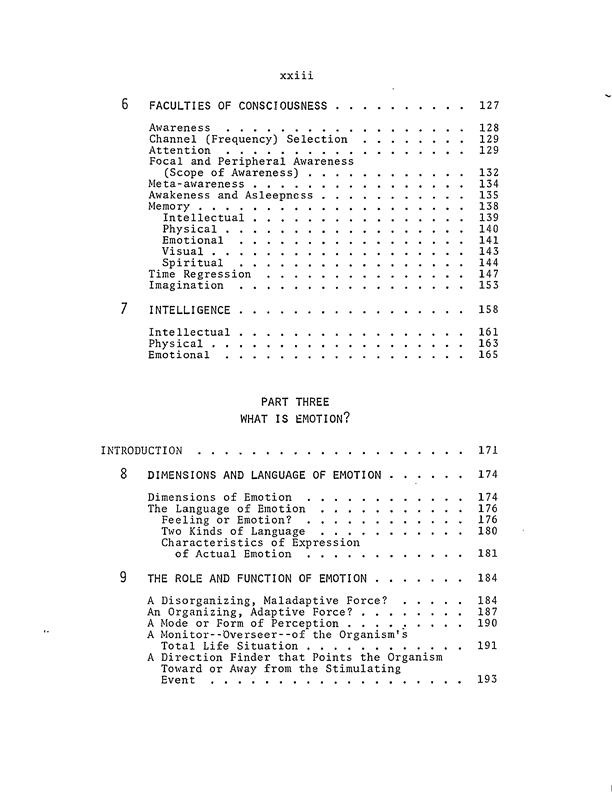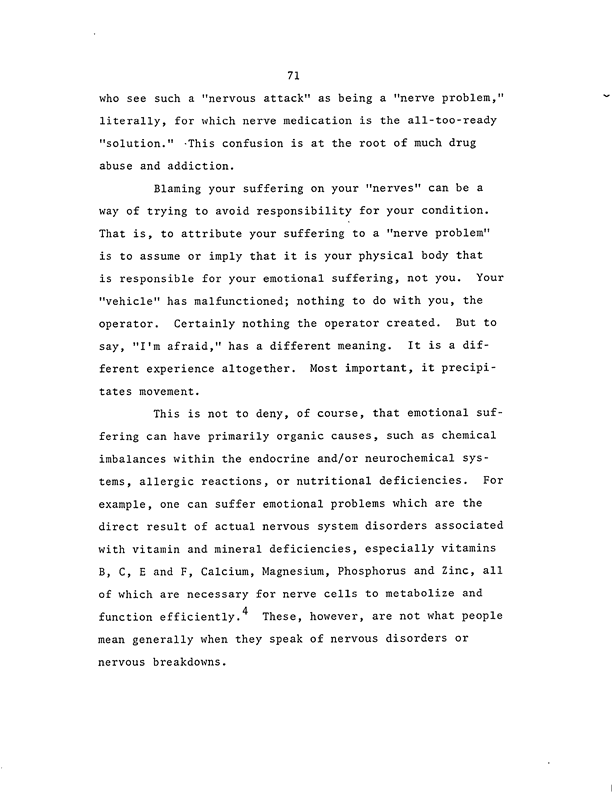| EQI.org Home | Emotional Intelligence Wayne Payne's
1985 Doctoral Paper on
Emotions and Emotional Intelligence
Update - 2015 - Full text copy of Payne's paper
Update - July
2011 - Excerpts from full
copy of Payne's paper
Introduction
My notes and selected quotes from the
abstract
The original abstract
More quotes (jpg files)
July
2011
Someone sent me a complete copy of
Wayne's paper on what he called emotional intelligence
back in the mid 1980's. It is one big image file since it
was put on microfilm before the days of the Internet. It
is hard to copy from but I have been able to clip some
sections of it as images to show you more of what is
inside it. It is well worth getting a copy of if you are
serious about studying or thinking about the concept of
emotional intelligence. (If you write to me and explain
your interest in it, I will try to send you a copy when I
have time.) (Sept 2011Note- with some help of friends, we
now have most of the microfilm in text format)
I am even more interested in
Wayne's writing after spending time reading the actual
paper rather than just the abstract which I saw before.
Page 58 -
Quotes mother writing about coach in the USA telling kids
to "leave the other guy bleeding"
The copy I was given is from
University Microfilms, Ann Arbor, Michigan, USA. I assume
you can get your own copy there, but I haven't confirmed
this. I also do not know if any other version is
available other than the image version which is not
searchable since it is not created from a digital text
file.
Introduction
Early writing on this page-
From 2005
In 1985 Wayne Payne published a
doctoral thesis titled, A STUDY OF EMOTION: DEVELOPING
EMOTIONAL INTELLIGENCE.
I am not sure when I first heard of
Wayne's thesis, but it was either in one of the
Mayer-Salovey articles, or when I talked with Jack Mayer in his office. But one thing I am sure of
is that Jack told me he had contacted the school Wayne
went to and ordered a copy of the entire dissertation. I
believe Jack did this around 1998 or 1999. Jack told me
he also tried to get in touch with Wayne but he learned
that Wayne had died. The school where Payne wrote this
paper has now been renamed The Union Institute. I believe
you can get a copy of the dissertation from them. Here is
the contact information.
After I spoke with Jack I found an
online copy of the abstract from Wayne's dissertation. At
that time I read it a little quickly and then put a copy
of it on my site without much comment. Today I read it
again and found new interest in it. The abstract clearly
suggests that Wayne had done a lot of thinking, and a lot
of original thinking, about emotions and what he called
"emotional intelligence" at least five years
before Salovey and Mayer published their first paper,
in 1990, using the term.
Wayne was obviously concerned about
how society has historically suppressed emotions. This is
something that Salovey and Mayer also seemed to be
concerned about in their original 1990 paper on EI,
though less so than Wayne. In comparison, Dan Goleman seems never to have been very concerned
about the suppression of emotion. Instead, he gives the
impression he believes we need to control and
"regulate" our emotions even more than we are
already taught to do.
Goleman's early, and apparently
continued, interest in meditation is one indication of
this. And his frequent use of the words
"regulate" and "appropriate" is
another indication. Goleman also said in his 1995 book
that the ability to wait and the ability to "follow
directions" are "elements of emotional
intelligence" (p 193)
Also, in his 1995 book he made it
clear that he thought the ability to "control
impulse" and "delay gratification" was a
main part of emotional intelligence. In contrast, Mayer
and Salovey have never included the ability to delay
gratification in their definition of EI.
Something else interesting to me is
how Wayne talked about "emotional ignorance."
He said that it causes social problems such as
depression, addiction, illness, religious conflict,
violence and war. I agree, but would add that our
problems are not just from emotional ignorance, but are
from what I call emotional poison. Parents, teachers and
other adults are not just ignoring emotions when they
teach and train children and teens; They are teaching
emotionally unhealthy lessons and giving them emotionally
toxic role models to follow.
I believe many children and teens
would be better off without the adults who they are being
raised, and often brainwashed, by. Just one example is
how a 13 year old female in England was urged to learn to
shoot a gun as part of her school training when her own
emotions were telling her to stay away from deadly
weapons. The same teen has been told "there is
nothing to be afraid of" when she has told the
adults and even older students that she is afraid of
going to the medical center at the school. In other
words, this teen, like so many around the world is being
systematically invalidated
and taught to discount the importance of her own
feelings. When her innate feelings tell her she does not
want to do something, she is called a "wimp"
among other toxic labels. (See Education in
England)
When I read what Wayne wrote in
1985 I have a sense that he was on the right track. A
sense that he understood the idea of emotional
intelligence perhaps better than Mayer, Salovey or
Caruso. And definitely better than the people I call
"fakes" in the field of EI today. I feel sad
that Wayne is no longer here to offer us his ideas. And I
feel very curious to know what is in the rest of his
dissertation. I would like to read it one day myself. If
anyone ever gets a copy of it, please let me know.
I may also try to contact some
people at The Union Institute in Ohio where he went to
school. Maybe some student would be interested in his
work and could help us all out by telling us more about
it.
Steve Hein
May 31, 2005
My notes and selected quotes from
the abstract
The abstract starts with this:
"This dissertation
introduces the concept of emotional intelligence...
" (note)
He then says a "theoretical
and philosophical framework is developed" to help us
understand the "nature and characteristics of
emotion and emotional intelligence" and to guide us
ways of "developing emotional intelligence--in self
and, by way of education, in others."
It is interesting to compare this
with what Salovey and Mayer wrote in 1990 in their first paper on
EI. They said:
"This article presents a
framework for emotional intelligence..."
With other authors I might feel
skeptical that they copied the idea of emotional
intelligence from Wayne Payne without giving him credit,
but knowing Jack
Mayer, this seems unlikely.
So my next thought was that in 1990 Salovey and Mayer did
not know of the existence of Wayne´s paper . My next
thought was "Why didn't they? Didn't they do a
research check to see if any one else had used the term
"emotional intelligence" before them? My next
thought was "Maybe they did, but the abstract hadn't
been available in any electronic form in 1990 so they
didn't know it ever existed, but maybe later, around
1999, when Jack Mayer was looking for the first use of
the term "emotional intelligence", it had been
added to an online database, and Jack found it. As I
recall, Jack told me he and his research assistants were
looking for earlier uses of the term emotional
intelligence because he and Peter Salovey never wanted to
be given credit for being the first to use the term.
In any case, later Payne says in
his abstract:
"Evidence is presented
that the mass suppression of emotion throughout the
civilized world has stifled our growth emotionally,
leading us down a path of emotional ignorance.
Then he says that many social
problems are the "direct result of emotional
ignorance". He lists as examples depression,
addiction, illness, religious conflict, violence and war.
I agree, but I would add suicide, especially teen suicide
to this list.
He then says that "perhaps we
humans have tried too hard to "civilize"
ourselves, trying to deny our true animal nature--our
emotional nature--along the way." He suggests that
we have done this "because we have had the wrong
idea altogether about the nature of emotion and the
important function it serves in our lives."
I agree with him on this.
He goes on to say, "This work
is intended to be a prototype of a guidebook on
developing emotional intelligence." He next lists
three ways his paper offers this guidance.
1. By raising important issues
and questions about emotion
2. By providing a language and
framework we can use to talk about emotion, emotional
intelligence and the related issues
3. By providing concepts,
methods and tools for developing emotional
intelligence
Then in the final line of the
abstract Wayne says emotional intelligence "involves
relating creatively to fear, pain and desire" and
says his dissertation offers guidance on "how to
relate to them in emotionally intelligent ways."
His choice of the word
"creatively" is interesting to me. I can't
think of many authors on EI who have said something like
this. They usually say something more like
"intelligently" but not "creatively."
To say "creatively" suggest that Wayne had the
idea that to be emotionally intelligent meant having the
ability to create new ways of responding to emotional
situations, as opposed to just repeating patterns that
you have seen modeled by those around you.
And this, is a very interesting
and, I believe, profound thought.
The
original abstract
A STUDY OF
EMOTION: DEVELOPING EMOTIONAL INTELLIGENCE;
SELF-INTEGRATION;
RELATING TO FEAR, PAIN AND DESIRE (THEORY, STRUCTURE
OF REALITY, PROBLEM-SOLVING, CONTRACTION/EXPANSION,
TUNING IN/COMINGOUT/LETTING GO)
Wayne Leon Payne
Degree: PH.D.
Year: 1985
Institution: THE UNION FOR EXPERIMENTING COLLEGES AND
UNIVERSITIES; 0557
Source: DAI, 47, no. 01A, (1985): 0203
Abstract:
This paper introduces the
concept of emotional intelligence, a faculty of
consciousness heretofore overlooked. A rigorous
theoretical and philosophical framework is developed to
throw light on the nature and characteristics of emotion
and emotional intelligence and to enable us to explore
how one actually goes about developing emotional
intelligence--in self and, by way of education, in
others.
Evidence is presented that the mass suppression of
emotion throughout the civilized world has stifled our
growth emotionally, leading us down a path of emotional
ignorance. Indeed, many of the problems facing society
today are the direct result of emotional ignorance:
depression, addiction, illness, religious conflict,
violence and war. Perhaps we humans have tried too hard
to "civilize" ourselves, trying to deny our
true animal nature--our emotional nature--along the way.
Whatever our motivation, however, we have not done this
out of any inherent evil nature. We've done this because
we have had the wrong idea altogether about the nature of
emotion and the important function it serves in our
lives.
This work is intended to be a prototype of a guidebook on
developing emotional intelligence. It offers guidance in
three ways: (1) by raising important issues and questions
about emotion; (2) by providing a language and framework
to enable us to examine and talk about the issues and
questions raised; and (3) by providing concepts, methods
and tools for developing emotional intelligence.
Since emotional intelligence involves relating creatively
to fear, pain and desire, these states are explored in
detail and guidance is offered on how to relate to them
in emotionally intelligent ways.
SUBJECT(S)
Descriptor: PHILOSOPHY
Accession No: AAG8605928
------------------------------------------------------------------------
Copyright FirstSearch
|


















